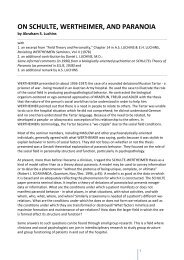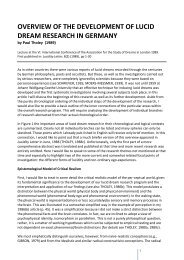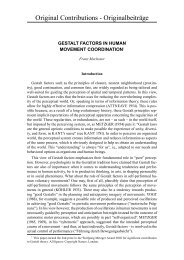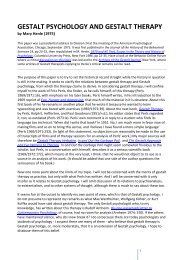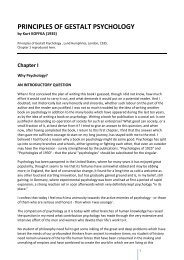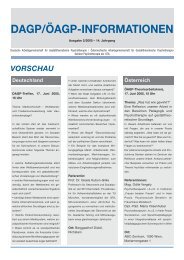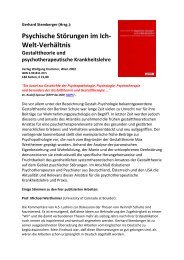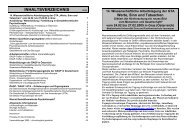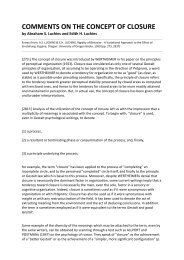pdf-Download - Society for Gestalt Theory and its Applications (GTA)
pdf-Download - Society for Gestalt Theory and its Applications (GTA)
pdf-Download - Society for Gestalt Theory and its Applications (GTA)
Create successful ePaper yourself
Turn your PDF publications into a flip-book with our unique Google optimized e-Paper software.
letter, he was an evangelical Christian, <strong>and</strong> probably an ordained minister. He first met my parents<br />
at Les Milles, <strong>and</strong> was transported with them to Rivesaltes from which the deportation trains <strong>for</strong><br />
"<strong>for</strong>ced labor <strong>for</strong> Germany" were filled. Giving the purpose of these trains as "<strong>for</strong>ced labor <strong>for</strong><br />
Germany" may well have been an attempt to avoid panic in the camps, <strong>and</strong> outrage on the<br />
outside, since many French citizens (including the courageous Pastor DUMAS) were aware of these<br />
deportations.[20] The description may even have been substantially correct, since Auschwitz, the<br />
<strong>for</strong>ced labor camp, had an associated extermination camp called Birkenau. In any case, the train<br />
from Rivesaltes carrying your gr<strong>and</strong>parents didn't go directly to Auschwitz, but rather to the Paris<br />
area where these prisoners were combined with Jews arrested in <strong>and</strong> around Paris, to make up<br />
train #33 which left Bourget/Drancy <strong>for</strong> Auschwitz. I think some excerpts will be of interest to you.<br />
FRAENKEL wrote, among other things:]<br />
Your father was a studious [or hard working] man. Day after day he studied his thick books, <strong>and</strong> he<br />
was always willing to make himself available <strong>for</strong> lectures. One saw him often, armed with his<br />
folding chair <strong>and</strong> a book, aiming <strong>for</strong> the sunny side of the courtyard to sit down there, or in<br />
summer [seeking] a shady corner. He sported a well-cared-<strong>for</strong> square beard – until your mother<br />
arrived [at camp, in 1941 or 1942] <strong>and</strong> his expressive face became visible without cover or<br />
adornment.<br />
At first, we did not underst<strong>and</strong> each other very well, because his philosophical <strong>and</strong> my theological<br />
interests were opposed to each other. I became very angry with him once when he demolished a<br />
lecture I had given with the brief comment, "I could not make sense of a single thing you said".<br />
Today I must admit he was right - the lecture was miserable. Nevertheless, I treasured his<br />
intellectual honesty, <strong>and</strong> he valued me highly, too. It became clear that we respected each other.<br />
And when your mother surfaced [came to Les Milles], (I do not remember any more when that<br />
was) our relationship became visibly more cordial, because I found her immediately approachable.<br />
And through her, I also came closer to your father. Our relationship also became more concrete<br />
because, as leader of the Protestant group, I had specific questions to discuss with your parents.<br />
[My father was nominally Christian, as you know, <strong>and</strong> there<strong>for</strong>e my parents would have been<br />
counted among the "Protestant" group.]<br />
In May 1942 I was sent with others to a [<strong>for</strong>ced] labor camp. The members of my bible study group<br />
organized a farewell event, which made me feel touched <strong>and</strong> honored, <strong>and</strong> <strong>for</strong> me it was really a<br />
great thing that your father attended, to show me his sympathy. It became clear to me what<br />
attracted us, two such different people, to each other, namely, the mutual recognition that we<br />
were both, in our own way, men of character, who publicly acknowledged our beliefs - his<br />
philosophical, <strong>and</strong> mine Christian.<br />
When the deportations began [i.e. when the French began to cooperate in the "final solution to<br />
the Jewish problem"], I was returned to Les Milles, <strong>and</strong> now, through our constant association,<br />
your mother <strong>and</strong> I developed a real fellowship. Her presence [in the camp] was of course a brave<br />
act of affirmation <strong>for</strong> her husb<strong>and</strong>. As an "Aryan" woman, she could have remained in Aix [-en-<br />
Provence]. But she courageously supported her husb<strong>and</strong>, who had no hope left. In earlier days,<br />
she had brought food to people hiding in the <strong>for</strong>est. She held her head high. I came to underst<strong>and</strong><br />
that she was the one who carried your father, a man of the intellect, through life. He was helpless<br />
in the face of [the realities of] life, seemed at first glance to be absentminded <strong>and</strong> absorbed within<br />
his thoughts, but he was a good human being, a man who loved disputation <strong>and</strong> who firmly held<br />
to his own views.<br />
17



